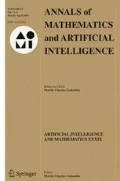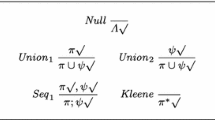Abstract
We develop an account of the kind of deliberation that an agent that is doing planning or executing high-level programs under incomplete information must be able to perform. The deliberator's job is to produce a kind of plan that does not itself require deliberation to interpret. We characterize these as epistemically feasible programs: programs for which the executing agent, at every stage of execution, by virtue of what it knew initially and the subsequent readings of its sensors, always knows what step to take next towards the goal of completing the entire program. We formalize this notion and characterize deliberation in the situation calculus based IndiGolog agent programming language in terms of it. We also show that for certain classes of problems, which correspond to those with bounded solutions and those with solutions without sensing, the search for epistemically feasible programs can be limited to programs of a simple syntactic form. Finally, we discuss implementation issues and execution monitoring and replanning too.
Similar content being viewed by others
References
P. Bertoli, A. Cimatti, M. Roveri and P. Traverso, Planning in nondeterministic domains under partial observability via symbolic model checking, in: Proceedings of IJCAI-01, Seattle (2001) pp. 473–478.
E. Davis, Knowledge preconditions for plans, Journal of Logic and Computation 4(5) (1994) 721–766.
G. De Giacomo, Y. Lespérance, H. Levesque and S. Sardiña, On deliberation under incomplete information and the inadequacy of entailment and consistency-based formalizations, in: Proceedings of the First Programming Multiagent Systems Languages, Frameworks, Techniques and Tools Workshop (PROMAS-03), Melbourne, Australia (2003).
G. De Giacomo, Y. Lespérance and H.J. Levesque, ConGolog, a concurrent programming language based on the situation calculus, Artificial Intelligence 121 (2000) 109–169.
G. De Giacomo and H.J. Levesque, An incremental interpreter for high-level programs with sensing, in: Logical Foundations for Cognitive Agents, eds. H.J. Levesque and F. Pirri (Springer, 1999) pp. 86–102.
G. De Giacomo and H.J. Levesque, Progression and regression using sensors, in: Proceedings of IJCAI-99 (1999) pp. 160–165.
G. De Giacomo, H.J. Levesque and S. Sardiña, Incremental execution of Guarded theories, ACM Transactions on Computational Logic 2(4) (2001) 495–525.
G. De Giacomo, R. Reiter and M. Soutchanski, Execution monitoring of high-level robot programs, in: Proceedings of KR-98 (1998) pp. 453–465.
M. Fisher, Towards a semantics for concurrent METATEM, in: Executable Modal and Temporal Logics, eds. M. Fisher and R. Owens, Lecture Notes in Artificial Inteligence, Vol. 897, Heidelberg, Germany (1995) pp. 82–102.
K.V. Hindriks, F.S. de Boer, W. van der Hoek and J.-J.C. Meyer, A formal semantics for an abstract agent programming language, in: Intelligent Agents IV-Proceedings of ATAL-97, eds. M. Singh, A. Rao and M. Wooldridridge (1998) pp. 215–229.
G. Lakemeyer, On sensing and off-line interpreting in golog, in: Logical Foundations for Cognitive Agents, eds. H.J. Levesque and F. Pirri (Springer, 1999) pp. 173–187.
Y. Lespérance, On the epistemic feasibility of plans in multiagent systems specifications, in: Pre-Proceedings of the 8th International Workshop on Agent Theories, Architectures, and Languages (ATAL-01), eds. J.-J.C. Meyer and M. Tambe, Lecture Notes in Artificial Inteligence, Vol. 2333, Seattle, USA (2001) pp. 69–85.
Y. Lespérance, H.J. Levesque, F. Lin and R.B. Scherl, Ability and knowing how in the situation calculus, Studia Logica 66(1) (2000) 165–186.
Y. Lespérance and H.-K. Ng, Integrating planning into reactive high-level robot programs, in: Proceedings of the Second International Cognitive Robotics Workshop (2000) pp. 49–54.
H.J. Levesque, What is planning in the presence of sensing? in: Proceedings of AAAI-96, Portland, USA (1996) pp. 1139–1146.
H.J. Levesque and G. Lakemeyer, The Logic of Knowledge Bases (MIT Press, 2001).
H.J. Levesque, R. Reiter, Y. Lespérance, F. Lin and R.B. Scherl, GOLOG: A logic programming language for dynamic domains, Journal of Logic Programming 31 (1997) 59–84.
J. McCarthy and P. Hayes, Some philosophical problems from the standpoint of artificial intelligence, in: Machine Intelligence, Vol. 4, eds. B. Meltzer and D. Michie (Edinburgh University Press, 1979) pp. 463–502.
S. McIlraith and T.C. Son, Adapting golog for programming the semantic web, in: Proceedings of the Eighth International Conference on Knowledge Representation and Reasoning (KR2002), Toulouse, France (2002) pp. 482–493.
R.C. Moore, A formal theory of knowledge and action, in: Formal Theories of the Common Sense World, eds. J.R. Hobbs and R.C. Moore (Ablex Publishing, Norwood, NJ, 1985) pp. 319–358.
M.A. Peot and D.E. Smith, Conditional nonlinear planning, in: Proceedings of the First International Conference on AI Planning Systems (AIPS-92), Maryland, USA (1992) pp. 189–197.
G. Plotkin, A structural approach to operational semantics, Technical Report DAIMI-FN-19, Computer Science Dept., Aarhus University, Denmark (1981).
A.S. Rao, AgentSpeak(L): BDI agents speak out in a logica computable language, in: Agents Breaking Away, eds. W.V. Velde and J.W. Perram, Lecture Notes in Artificial Inteligence, Vol. 1038 (Springer, 1996) pp. 42–55.
R. Reiter, The frame problem in the situation calculus: A simple solution (sometimes) and a completeness result for goal regression, in: Artificial Intelligence and Mathematical Theory of Computation: Papers in Honor of John McCarthy, ed. V. Lifschitz (Academic Press, 1991) pp. 359–380.
R. Reiter, Knowledge in Action: Logical Foundations for Specifying and Implementing Dynamical Systems (MIT Press, 2001).
R. Reiter, On knowledge-based programming with sensing in the situation calculus, ACM Transactions on Computational Logic 2(4) (2001) 433–457.
S. Sardiña, Local conditional high-level robot programs, in: Proceedings of LPAR-01, Lecture Notes in Artificial Inteligence, Vol. 2250 (2001) pp. 110–124.
S. Sardiña and S. Shapiro, Rational action in agent programs with prioritized goals, in: Proceedings of the Second International Joint Conference on Autonomous Agents and Multiagent Systems (AAMAS-03), Melbourne, Australia (2003) pp. 417–424.
R. Scherl and H. Levesque, The frame problem and knowledge-producing actions, in: Proceedings of AAAI-93, Washington, DC (1993) pp. 689–695.
D.E. Smith, C.R. Anderson and D.S. Weld, Extending graphplan to handle uncertainty and sensing actions, in: Proceedings of AAAI-98, Madison, USA (1998) pp. 897–904.
D.E. Smith and D.S. Weld, Conformant graphplan, in: Proceedings of AAAI-98, Madison, USA (1998) pp. 889–896.
M. Thielscher, Inferring implicit state knowledge and plans with sensing actions, in: Proceedings of the German Annual Conference on Artificial Intelligence (KI-01), Lecture Notes in Artificial Inteligence, Vol. 2174 (2001) pp. 366–380.
M. Thielscher, Programming of reasoning and planning agents with FLUX, in: Proceedings of KR-2002, eds. D. Fensel, F. Giunchiglia, D. McGuinness and M.A. Williams, Toulouse, France (2002) pp. 435–336.
Author information
Authors and Affiliations
Rights and permissions
About this article
Cite this article
Sardina, S., De Giacomo, G., Lespérance, Y. et al. On the Semantics of Deliberation in IndiGolog — from Theory to Implementation. Annals of Mathematics and Artificial Intelligence 41, 259–299 (2004). https://doi.org/10.1023/B:AMAI.0000031197.13122.aa
Issue Date:
DOI: https://doi.org/10.1023/B:AMAI.0000031197.13122.aa




